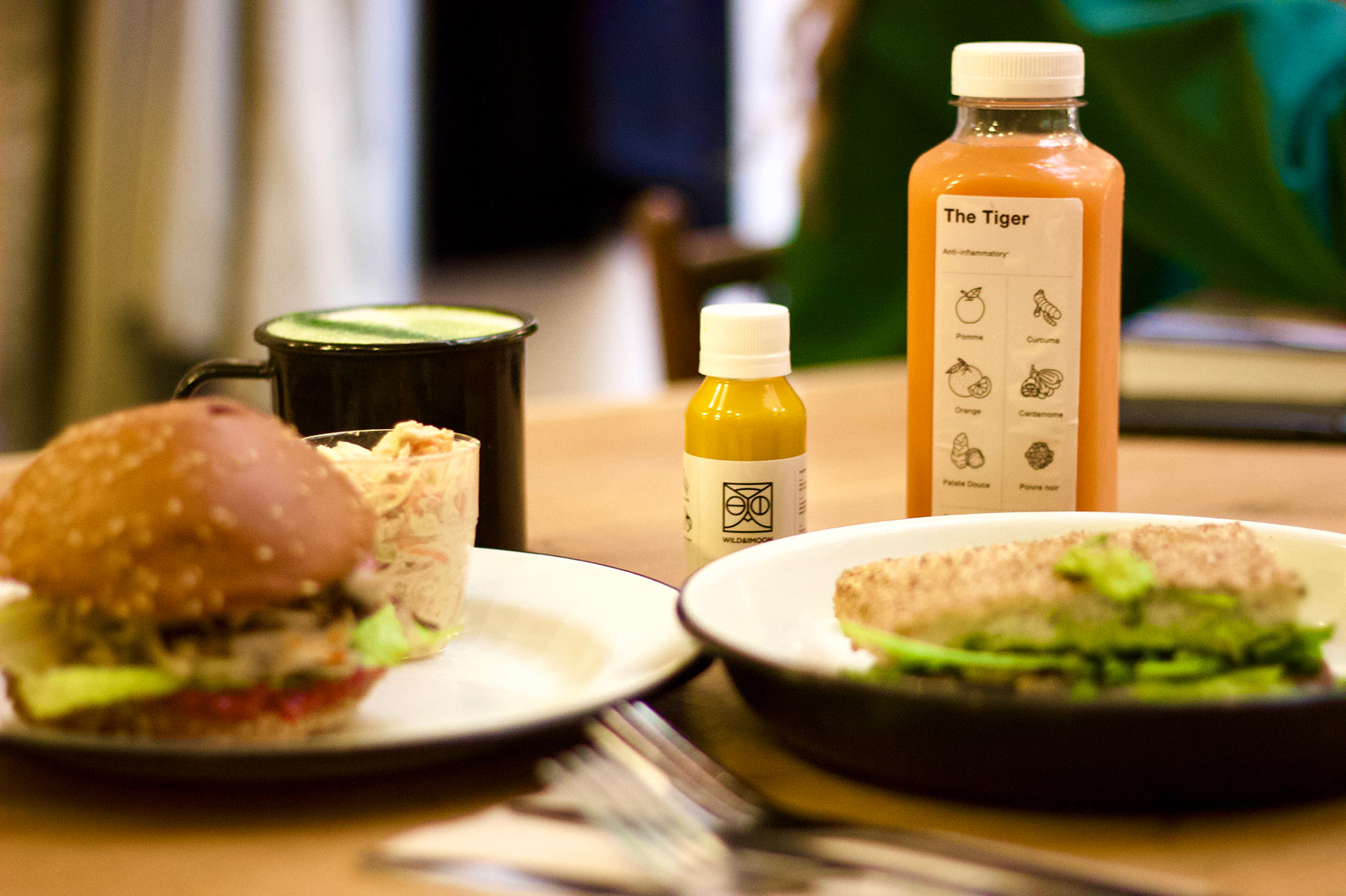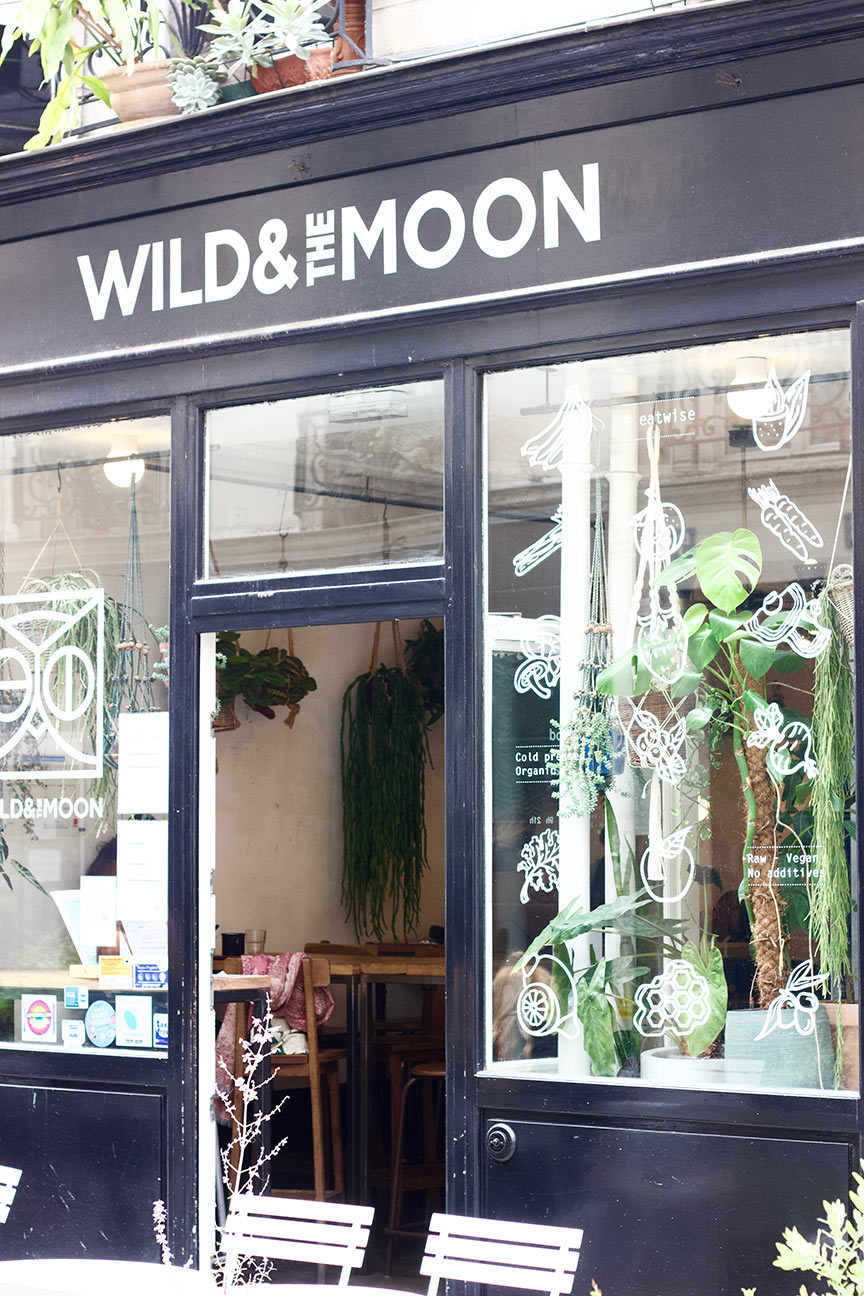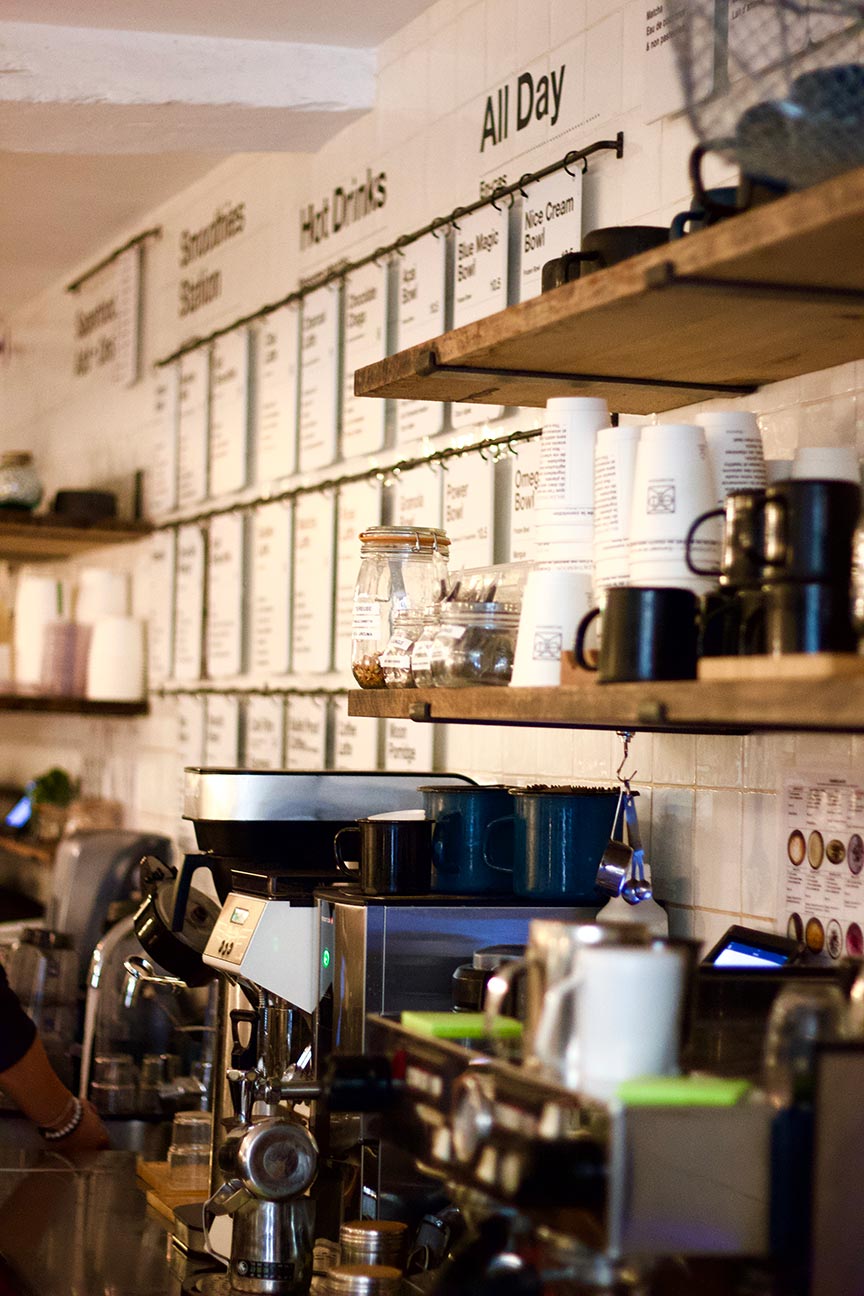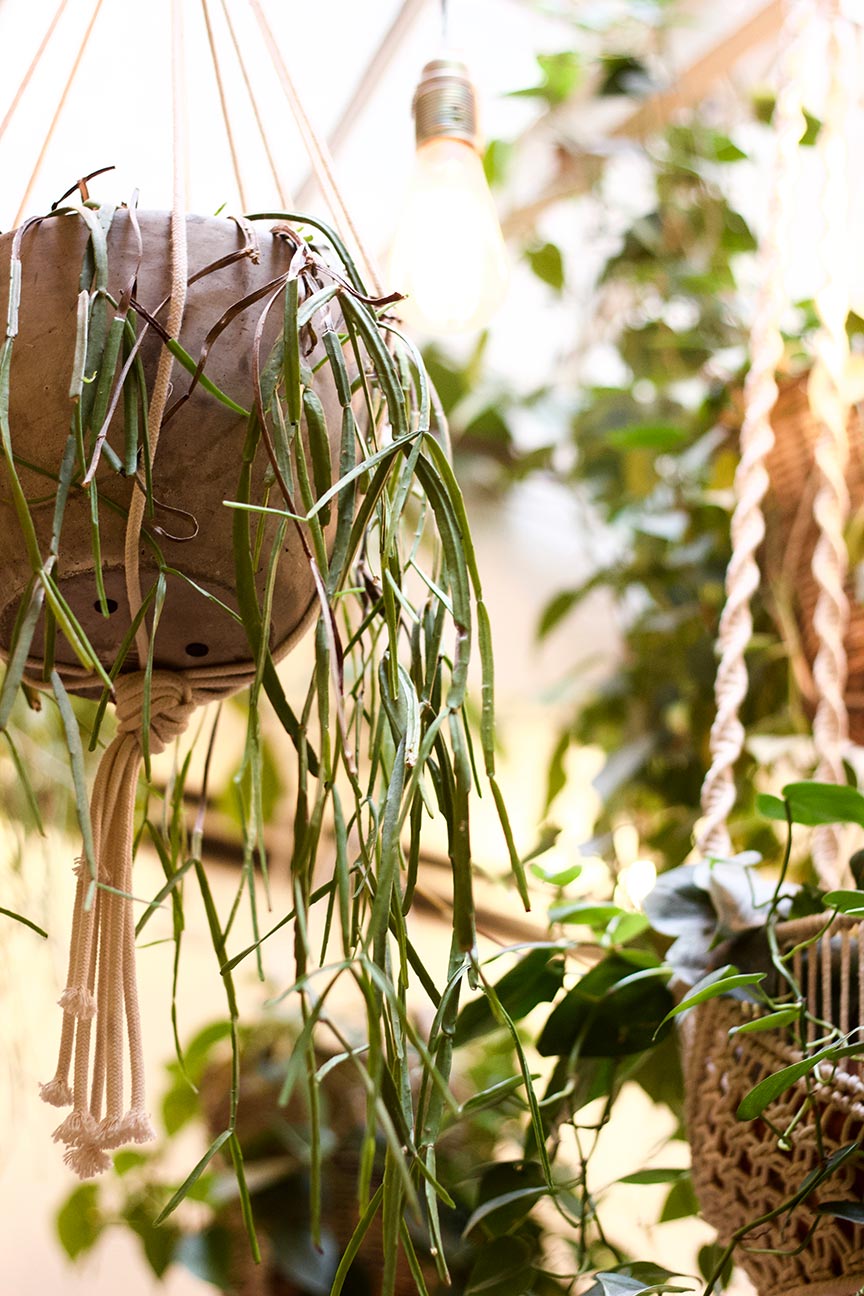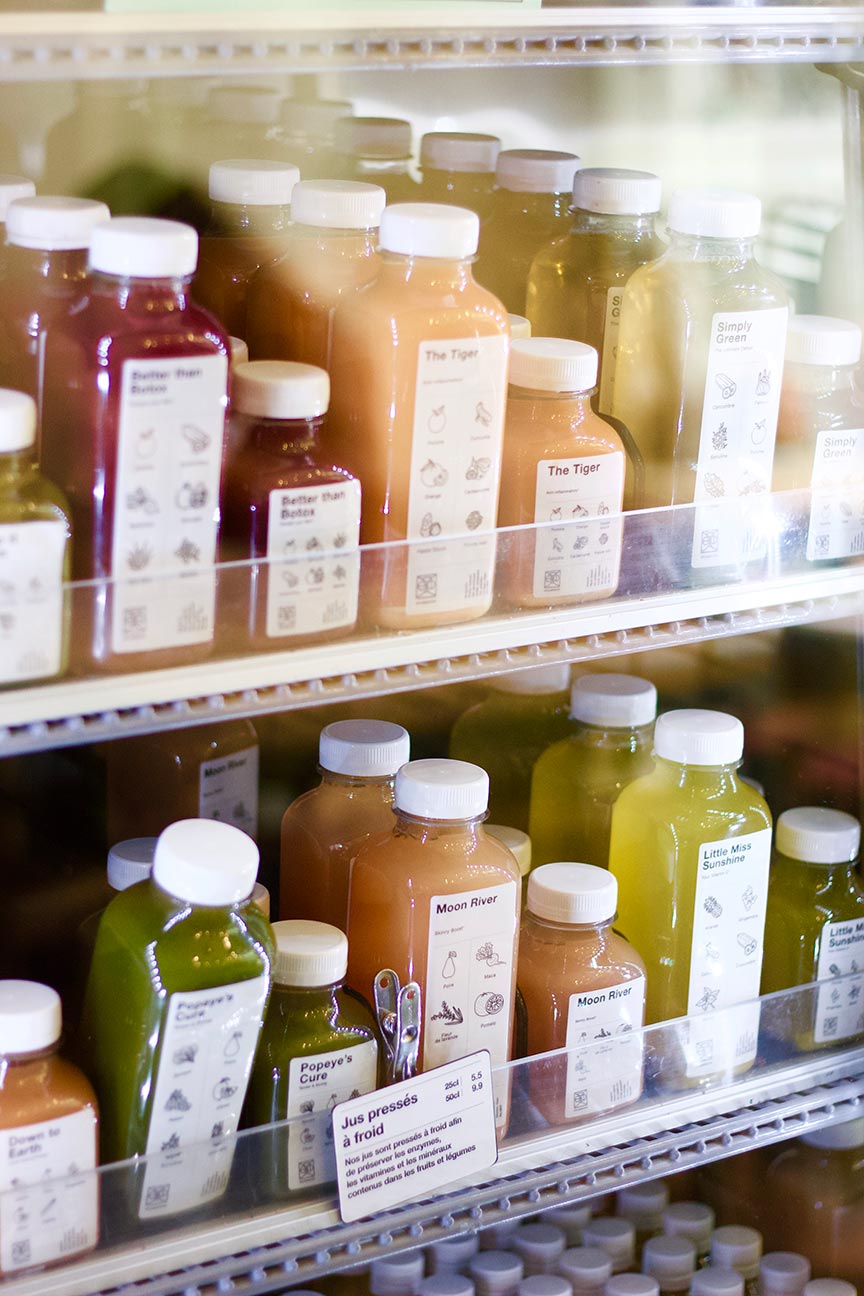The Optics and Ethics of Vegan Restaurants
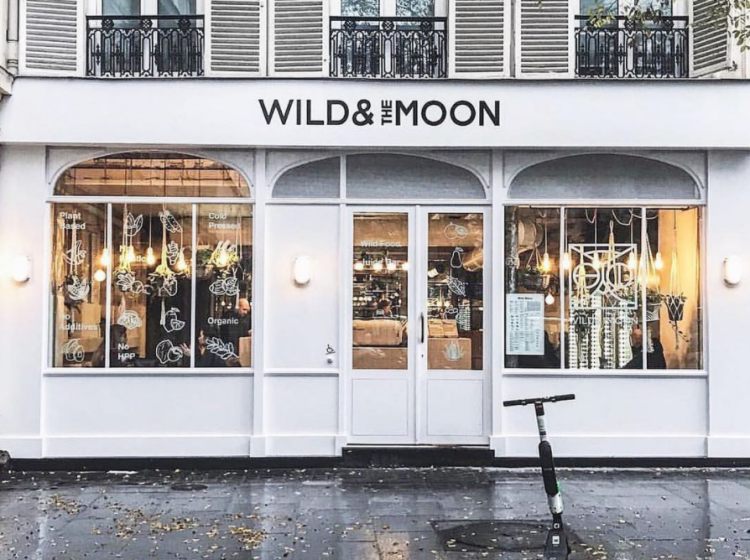
With contributions by Leanna Davis
Plants hang from the ceiling, CBD oil sits in front of the cash register, the grocery store styled refrigerators are stocked with prepackaged and colorful foods, and recipe and home decor books line the shelves. The psycho-cryptically named Parisian vegan eatery called Wild & the Moon is the sort of place an eco-design student on a low dosage of psychedelics might describe as an ideal juice bar and working space.
Veganism in France might be considered an oxymoron. Imagining France without cheese, baguettes, and those cute little charcuterie boards may seem impossible. For some, the thought of being unable to consume these culturally rich foods detracts from their pleasure and quality of life. For others, however, it allows them to consider and protect the pleasure and quality of life of species that they don’t belong to, and even on a more general level to amplify the resect for all life. Still, the French market has long been skeptical about veganism as it contradicts the traditional staples of French cuisine.
Wild & The Moon food, Image credit: Maddie CzarnikVegan and eco-friendly eateries have become popular worldwide as the existential angst of climate change and planetary destruction has become a mainstream marketing topic. The vegan trend, despite the cultural attachment to traditional cuisine, has also arrived in France. A study by research body Xerfi in 2019 shows that sales of vegan and vegetarian products had increased by 24 percent in France that year, and notably that they expected that number to continue to increase by about 17 percent each year following.
Vegan businesses can sometimes be discounted as "greenwashing". Green marketing have long held their important place in the world of commerce, but as the clock in New York City ticks down on our collective and irreversible planetary demise, some say it has become a practice akin to a crime. This isn’t pessimistic to write off the amazing work of small-scale vegan and ethical businesses, cafés, and restaurants —just a reminder to eat with your eyes wide open. From unintentional cross-contamination of animal products in vegan-safe foods, literal cult-owned (not denoting popular, but rather an actual religious cult) vegan restaurants, scandals regarding the health implications of the famous Beyond Meat meat replacement products and less surprising scandals regarding McDonald's claim that their fries were vegetarian when they were being doused in beef stock (this has since been resolved)— the label ‘vegan’ does not mean vegan institutions and vegan food are without their problems.
Paris has an active vegan-friendly food scene. A large portion of these ethical and vegan eateries in Paris remain clustered in the Marais quartier, which also carries a heavy stamp of rich Parisian "bobo" culture. From burgers and pasta to everything in between, you can find whatever your stomach and moral values may be craving. However, with the rapid growth of some of these businesses comes complications with their commitments to remaining green, eco-friendly and giving you the nutritional as well as nourishing food they want you to believe that it is.
“Bobo” is a French slang term for “bourgeois-bohème”, which delivers connotations of wealthy young hip upstarts who wear their morals and their money on their sleeves. The term is usually not used endearingly, just as vegan can be used snobbishly by those who enact it as a lifestyle, and those who use it as a derogatory adjective to disregard the strong morals of others. Xerfi, the research body responsible for the study on the expansion of the vegan and vegetarian boom in France, lend credit for the rising interest and consumption of vegan products to a form of ‘flexitarianism’, which is when people assume a higher moral stance in the form of feelings of superiority towards their non-vegan counterparts.
“I would definitely say that superiority is something that comes up in the vegan community because you’re taking a moral stance and when you’re taking a moral stance that is different from everyone else, you can come off as holier than thou," says Chloe Lyons, president of the Vegan Club at AUP. "So, in a way, you are acting more morally, but there was definitely a time when you weren’t.”
The bigger critique that comes with the "bobo" label is the price tag that's often associated with that which they consume. This article released in 2016 by Metro.uk states that going vegan will cost you approximately 2000 pounds more annually. However, there are several articles such as this one from Stunninglyplantbased.com that deny that veganism is more expensive; in fact, a lot of the core foods of a vegan diet; lentils, beans, and grains are among the cheaper options in a grocery store. The article, and many vegans, argue that it simply depends on your kind of vegan consumption. The argument has been made successfully on both sides that eating vegan can increase your spending, as well as that it can decrease your spending.
From interviews with vegan and green-concerned consumers here in Paris, a consensus emerged about the must-visit vegan eateries in and around the Marais which includes Cloud Cakes, Hank Burger, Furahaa to go, Love Juice Bar, Abattoir Végétal, Le Potager du Marais and Wild and the Moon. Other notables not located in the Marais include Bhodi Vegan, Aujourd'hui Demain, Soya and Le Tricycle. The most 'instagram-worthy' of this group is arguably the vegan chain, Wild & the Moon.
Wild & The Moon is what Starbucks would look like if it were ethical, vegan and used vegetal plastic. This café, with locations in Paris and Dubai, is the perfect case study for why some ethically driven consumers have trouble sleeping at night. Wild & The Moon was launched in 2016 in Dubai by Emma Sawko, her husband Hervé and their business partner Greg.
Born to Parisian parents in New York, Sawko grew up in Switzerland where she studied hotel management. After spending twelve years in advertising as the Board Account Director at DDB, which describes itself as a full service integrated communications agency, she met her investment banker husband and his work led them to Dubai. It was there that, in 2012, Sawko's idea of creating a juice bar & eatery completely based on health foods and eco-friendly alternatives to plastics became her first endeavor, Comptoir102.
Sawko was discouraged from the start, told there wasn't a big enough market for what she wanted to accomplish. However, the success of both Comptoir102 in Dubai and Wild & the Moon in Paris showed just how wrong her critics were. The success of the food and its quality is evident. Though one critique, not about the food itself, was about the prices — which in association with the "bobo" label, seems unsurprising.
Wild & The Moon entrance, Image credit: Maddie CzarnikWild & the Moon immediately hits you with the before mentioned “bobo” and “vegan” clichés as soon as you walk into its plant-lined and minimalist designer chic walls. The attitude is palpable and the crowd is nothing if not oh-so busy and extremely fashionable. Since the beginning, Wild & the Moon has wanted to become the ‘bio Starbucks’, but one problem with café chains is that it’s virtually impossible for them to follow sustainable business models because of the size and path for expansion.
In the same year that the café-restaurant opened in Dubai, it also expanded to 55 rue Charlot in Paris. Since 2016, Wild & the Moon has opened five new locations in Paris for a total of six today. That isn’t even counting their Lafayette Anticipations installation which you can read about here, described as "a catalyzer, providing artists unique, made-to-measure conditions in which to produce, experiment and exhibit.
What is lauded and deemed by many as one of the most established and trendy vegan eateries in Paris has also raised some larger questions. Is having healthy and vegan food enough in today's society? How can a café that claims to use compostable plastic, all-vegan food, premade and made on-site and is highly popular with a fashion-minded crowd (notorious for greenwashing) continue an ethical and sustainable business model?
Wild & The Moon, Image credit: Maddie CzarnikIn the U.S. 80 billion pounds of food is thrown away each year, which accounts for 40 percent of the U.S. food supply and equates to 219 pounds per person and $1,600 per family. In France, a study from 2018 shows that 10 million tons of food equaling 16 billion euros is thrown away each year and in the EU that number rises to 88 million tons of food thrown away in 2010. Food waste has environmental repercussions as “it wastes the water and energy it took to produce it and generates greenhouse gases — 7 percent of the world’s emissions”. Not only does it contribute to climate change, but food waste also has economic repercussions; multiply the $1,600 annual waste per family in America by the 18 years of life a child will spend at home and you could pay for most American private university tuition fees.
At Wild & the Moon, employees described overproduction and food thrown out almost daily. Emma Sawko counters that her cafeés "have a very low percentage" of food waste. "It’s a very, very difficult balance to reach and, at a certain point, this company is also here to make money," she said in an interview at the restaurant. "Of course, we have had moments where there wasn’t enough, we have had moments where there was too much. We’re trying to monitor very closely [what we produce], there’s a central kitchen and every manager is responsible for their own restaurant and orders. If there’s too much waste, I’m not putting the shame on them, but the team is the best to know what they should order; we are there at the end of the month to make sure that there isn’t too much waste. Because what is waste? Waste is also money that we’re not making. We also have some very fresh products that we don’t want to go bad so, for sure, it’s much harder to make orders that are accurate.”
Wild & the Moon does boast No HPP, or High Pressure Processing, as part of their values, which would explain the food waste. High Pressure Processing "is a cold pasteurization technique by which products, already sealed in its final package, are introduced into a vessel and subjected to a high level of isostatic pressure transmitted by water...[that] respects the sensorial and nutritional properties of food, because of the absence of heat treatment and maintains its original freshness throughout the shelf-life." Instead, Wild & the Moon favors cold-pressed juices, which are meant to retain more of their nutrients, but also run the risk of expiring more quickly and attributing to greater food waste as a whole.
Wild & The Moon food, Image credit: Maddie CzarnikSawko also mentions the applications Too Good to Go and Food Karma Wild & The Moon uses that allows you to purchase discounted ready to made meals and produce that would otherwise be thrown out by local supermarkets, boulangeries, wineries and other eateries like Wild & the Moon. This helps to mitigate food waste for companies and to allow consumers to have cheaper and sustainable ways of shopping. Several employees commented on the effectiveness of this method, one saying that “the general director [at my location] decided not to [use it], because we do have a lot of waste at the end of the day, not every day, but it happens, and this guy said we’re not allowed to put a lot on Too Good To Go because then it will depreciate the work of the kitchen workers. Which is bullsh*t.” Another commented that this food waste management scheme normally only works at about 50 percent effectiveness because the workers often don’t care enough, and sometimes avoid putting anything on Too Good to Go at all.
“I can also say that what they don’t see is that in our kitchen, the percentage of waste is very minor compared to other kitchens because we use absolutely everything that we get," adds Sawko. "Meaning that for example if we do a carrot soup, we’re going to use the greens of the carrots too when we do press our juices, and you get the pulp of the fruits of vegetables. We’re never going to throw that away, we’re going to reuse that and make dishes out of that. When we press almonds to make nut milk we use the pulp of the almonds to do cooking. I would say we’re not a perfect example of how to avoid waste, but a good one.”
Asked about the chain's commitment to sustainability, a previous employee who worked at one location in 2018 said: “Their concept involves striving for sustainability and zero waste which seemed great to me. However, they did not meet the requirements for this. When I was working there we had to throw away a huge amount of food. When we did throw all of this food away there was no way of recycling the different materials or the foods, everything was thrown in the same bin. I really tried to take as much home with me as possible, but I still had to throw a lot away. With this in mind, I found it weird that the staff, later on, weren’t allowed to eat the plat du jour and were told to eat whatever was left from the day before.”
The plastic that Wild & the Moon uses is branded as ‘plastique végétal’ and according to one employee, is “basically corn starch and canned sugar”. This was the general consensus as to what the plastic was made out of, with a few employees not even really knowing what it was. Wild & the Moon boasts next to zero waste, claiming that even the adhesive for the stickers on their products is better than conventional materials. The same employee explains that “the thing about the plastic is that you still need compost to break it down. If you put it into the trash it takes a lot of time still to be destroyed, you have to have a true compostable area and they don’t really exist in Paris.”
Asked about this, Sawko responded with refreshing transparency. “The material itself is more advanced today than the way that we can recycle," she said. "This material is quite recent and the way to get rid of it is not in place in Paris. It’s not ideal, hopefully, it [a composting option] will arrive soon, but I would say that we’re doing the best we can with the materials that exist.”
In the wider national context, a 2017 study showed that France only recycled 27 percent of its overall plastic production as opposed to as much as 42 percent that was recycled by all of the EU. In fact, only nine percent of the world's plastic has actually been recycled. What's worse, with the rise in consciousness surrounding how much of this plastic is in our oceans and has been reduced to micro-plastics that can now be found in most organisms stomachs across the globe, Wild & the Moon seemed less concerned about their recycling and more about their overall image. This is impressed upon us further by their tagline: No Plastic, Gluten Free, Homemade, No Additives, Cold-Pressed No HPP,100% Plant-based. The tag "Local & Organic" is splashed everywhere from their website to their Instagram bio and the front of their stores. This is their leading marketing strategy and it's clear that the 'No Plastic' in this particular tagline does little to inform the consumer about the reality of the situation.
Aside from France having no industrial composting facilities, bioplastics also create problems with their disposal because of the belief that it will just biodegrade with time. This can actually engender even more litter and waste in the short-term. Luckily, bioplastics do boast the lowest carbon footprint in the market today, reduced greenhouse gas emissions in production and a one to 10 year decomposition rate instead of the millions of years that it would take petro-plastics to decompose.
Wild & The Moon interior, Image credit: Maddie CzarnikSome workers at Wild & The Moon recall extra hours without overtime pay and difficult work conditions. “I think people see it as a hip, expensive place with healthy foods," said one ex-employee. "Some people might see through it and understand that it can’t really fulfill all the good intentions they claim they do. At least us ex-workers have that attitude I’d say. My opinion is that most of us who have worked there [were] tired of Wild & the Moon and think that most of their claimed values are only superficial. It doesn’t get carried through.” Another employee: “I always think I got hired because of my looks because they didn’t even interview me. I just applied on Instagram and they brought me in. It wasn’t even an interview, they just said, 'you start on Monday.'”
Emma Sawko insists that “no one has entered our company without signing a contract; no matter what they tell you, they know what kind of contract they would have.” She adds that each role is clearly defined as far as responsibility, hours and pay.
The Wild & the Moon chain took off with the help of the fashion industry. Sawko described a relationship with the fashion industry that seemed to blossom from the very outset with a high volume of customers during Paris Fashion Week, when all of their products get completely sold out. Wild & the Moon is indeed focused on appearances. It currently counts around 93K followers on Instagram. Employees say when a consumer comes to Wild & the Moon, “everything has been thought of so that you will take a picture and put it on Instagram."
Sawko says Wild & the Moon "looks very cool from the outside. We have a lot of people who want to work because it has this cool vibe, and then suddenly they come here, and you know what, it’s a lot of work and maybe it’s something they weren’t prepared for. And maybe we hadn’t prepared them well enough, which is possibly the case.”
“To tell you the truth it was horrible," adds Sawko, "because when we first opened Wild & The Moon in the Marais, the first one, I was freaking out because the opening was announced, there was a lot of people waiting for it and it was already in the press, so I knew I had to open but I wasn’t ready at all. The recipes were not to the standard that I wanted, the labels were not on the bottles and we didn’t even have a cashier. It was a complete mess. The day that we opened there was a huge line along rue Charlot and I told my husband that I can’t stay, it’s too much for me.”
Marketing success and the execution of that idea are very different, however, and it seems that in some ways Wild & the Moon became a victim of its own image. The price of trendy success is often overstressed restaurant workers serving never-ending lines of the fashion elite. But Wild & the Moon’s popularity as a “bobo” spot, as well as it’s accessibility to English speaking workers, means that they are never in short supply of people who want to work there.
Wild & The Moon juices, Image credit: Maddie CzarnikEthical consumers need not despair, however. Bowls, burgers, burritos and hotdogs are the main sections to the menu of the all-vegan ‘fast-food’ Parisian eatery known as Furahaa to go. Not the typical introduction to a vegan restaurant that one might expect.
“I found it on Deliveroo," says Mimi Vickery, a junior at AUP. "What really sold me were the fried chicken wraps---vegan and so good. They have so many vegan classic American foods, they have vegan donuts; crispy crème styled donuts which I get on the regular. It’s also reasonably priced, such good vegan food and a Black-owned business, so I love supporting them.” Furahaa, which means ‘joy’ in Swahili, is also an establishment that works with deaf workers and allows you to integrate and discover the language and deaf culture. This is definitely a vegan eatery that we can get behind. However, just like all businesses, it is sure to have it's own struggles and complications.
Outside Furahaa to Go, Image credit: Maddie CzarnikIt is evident that in our search to become conscious consumers the restaurants where we dine at are not as straightforward as we would like to imagine. The Paris vegan scene is vast and continuously growing. However, a vegan eatery that markets sustainability is not always synonymous with being ethical, and doesn’t always deliver on its promises. We should continue to eat better and choose better than we have in the past, but don’t let marketing and Instagram followers fool you. Perfection does not exist, but transparency ensures that it never has to. And as long as consumers are aware of the underlying problems that comes with even their 'ethical consumption' we can continue to eat our way into a brighter tomorrow.
Wild & the Moon Locations:
Wild & The Moon Charlot, 55 rue Charlot, 75003 Paris
Wild & The Moon Gravilliers, 25 rue des Gravilliers, 75003 Paris
Wild & The Moon Amelot, 138 rue Amelot, 75011 Paris
Wild & The Moon Opéra , 4 rue du Helder, 75009 Paris
Wild & The Moon Lafayette Anticipations, 9 rue du Plâtre, 75004 Paris
Wild & The Moon Charenton, 149 rue de Charenton, 75012 Paris

